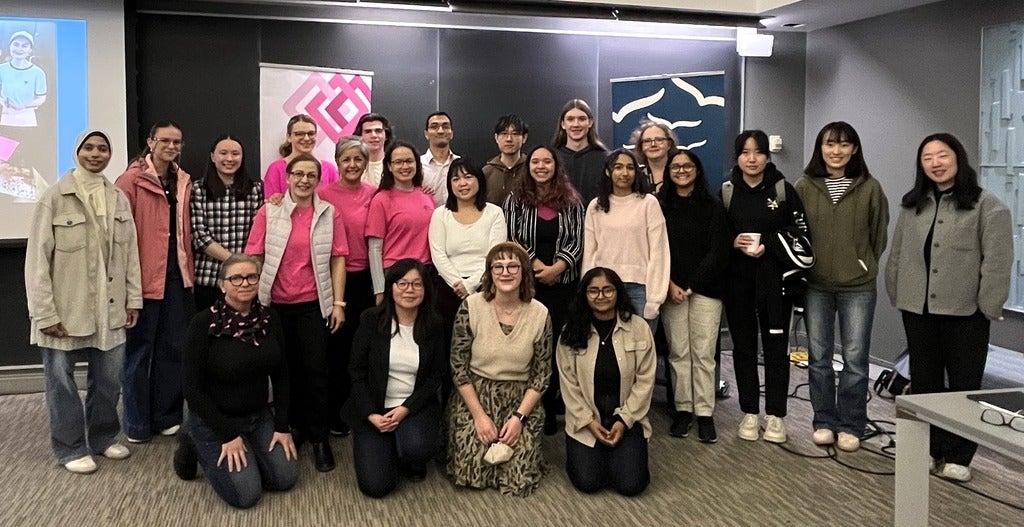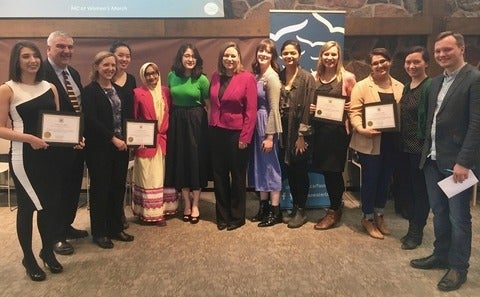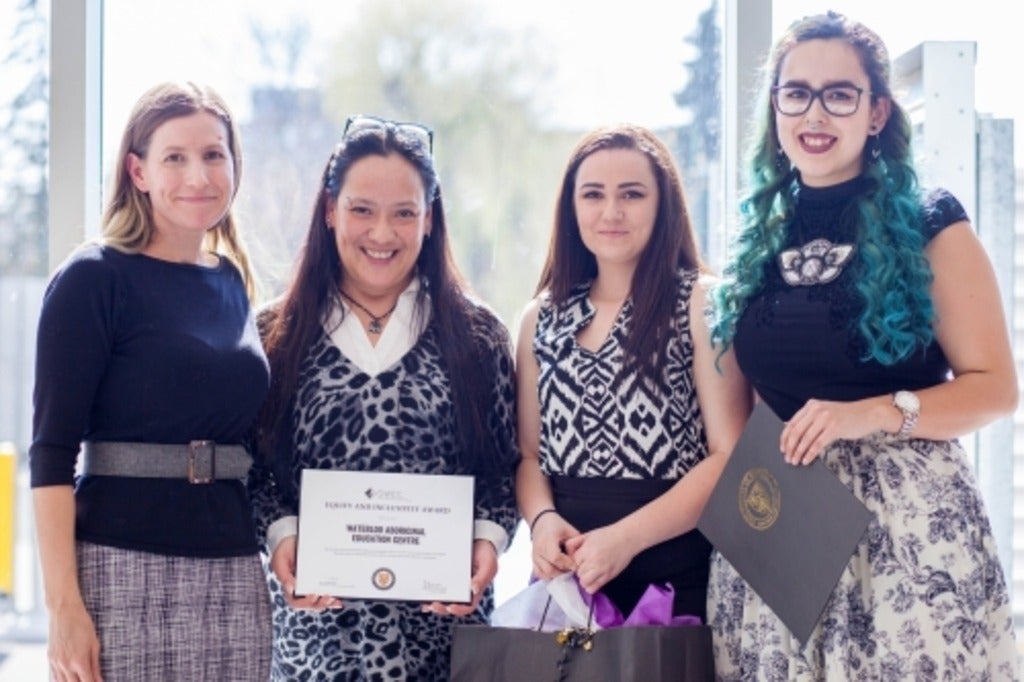FAUW's Equity and Inclusivity Award is a celebration of excellence in equity, inclusivity, and diversity. Inaugurated in 2012, the award recognizes a member or affiliate of the University of Waterloo community whose actions have demonstrated an exemplary commitment to improving equity, inclusivity, and/or diversity at the University of Waterloo. The award is adjudicated by a subcommittee of FAUW's Equity Committee.
Recipients receive the lifetime title of FAUW Equity Fellow.
Featured recipients
Balancing the equation for Women in Mathematics
Women in Mathematics has transformed the landscape of academic research and industry networking opportunities available to women+ students at all levels of the Faculty of Mathematics. During this time, WiM’s flagship programs have blossomed into essential infrastructure that plays a critical role in guiding women+ students to success post-graduation, achieving meaningful engagement with many hundreds of students, while largely offsetting program costs through external sponsorships obtained by way of their own independent efforts.
Changing the face of faculty in engineering and technology
Launched in January 2021, the IBET PhD Project has already produced 56 IBET Momentum Fellows across Canada. Founding Director Tizazu (Tiz) Mekonnen, FAUW’s 2024 Equity Fellow, sees the potential for so much more.
Hilary Bergsieker named FAUW's 2023 Equity Fellow
The FAUW Equity Committee recognizes Dr. Hilary Bergsieker's tireless efforts and significant contributions in equity and awards Dr. Bergsieker the 2023 Equity and Inclusivity Award.
Black Graduate Archive wins 2022 Equity and Inclusivity Award
Inaugurated in 2012 by the Faculty Association’s Equity Committee (then the Status of Women & Equity Committee, or "SWEC"), the Equity & Inclusivity Award recognizes a group, member, or affiliate of the University of Waterloo community whose actions have demonstrated an exemplary commitment to improving equity, inclusivity, and/or diversity at the University of Waterloo. The award has recently shifted to emphasize supporting continued equity work, rather than providing a reward for past work.
Award Reception Celebrates Equity, Inclusivity, and Diversity Champions
There are so many people working to make Waterloo a more inclusive place that the Faculty Association’s Equity Committee presented four Equity and Inclusivity Awards this year instead of one.
Waterloo Aboriginal Education Centre wins Equity and Inclusivity Award
If you’ve ever been to an event at the Waterloo Aboriginal Education Centre (WAEC), you might have a pretty good idea of why the University’s Status of Women and Equity Committee (SWEC) awarded the Centre with the 2017 Equity and Inclusivity Award.
FAUW Equity Fellows
2025:
- Women in Mathematics (WiM)
2024:
- Tizazu (Tiz) Mekonnen
- High commendation: Jen Parks
2023:
-
Hilary Bergsieker
2022:
- The Black Graduate Archive
2019:
- Benoit Charbonneau
- Corey Johnson
- Sarah Lau
2018:
- Christine Logel
- Sarah Wiley
- Treaty Lands, Global Stories
- Women in Computer Science
2017:
- Waterloo Indigenous Student Centre
2016:
- FemPhys
2015:
- Jeremy Steffler
2013:
- Women in Engineering
2012:
- David DeVidi
2025: Women in Mathematics (WiM)
Women in Mathematics has transformed the landscape of academic research and industry networking opportunities available to women+ students at all levels of the Faculty of Mathematics. WiM’s flagship programs have blossomed into essential infrastructure that plays a critical role in guiding women+ students to success post-graduation, achieving meaningful engagement with many hundreds of students, while largely offsetting program costs through external sponsorships obtained by way of their own independent efforts. These programs include: Directed Reading Program, Ontario Graduate Mathematics Conference, Navigating Your Careers (NYC) Conference, Women of Waterloo (WoW) and Pizza Piazza.
2024: Tizazu (Tiz) Mekonnen
Tiz is the founding director of the IBET PhD Project. This project provides funding, mentorship and networking opportunities for Black and Indigenous PhD students in engineering and technology fields at 19 universities across the country. The project's aim is to increase representation of Black and Indigenous people in faculty positions, but also serves to support these students' entry into industry. The IBET PhD Project has already produced 56 IBET Momentum Fellows.
Jen Parks - High commendation
Jen Parks is the inaugural Associate Dean for a Diverse, Inclusive and Safe Science. Dr. Parks has consistently demonstrated an exceptional commitment to equity and inclusivity throughout her 10+ year career at University of Waterloo. She has created a safe and accessible learning environment for all students, making significant efforts to accommodate diverse needs in her courses. She is a trusted resource for students facing various challenges, connecting them with essential support services. Dr. Parks is also actively involved in faculty and staff initiatives promoting equity and inclusivity, offering guidance and support on relevant procedures and resources. Her dedication to fostering a diverse and inclusive community has had a profound and positive impact on University of Waterloo.
2023: Hilary Bergsieker
Dr. Bergsieker was involved in the President's Anti-Racism Taskforce (PART) as a member of the Equity Data Advisory Committee from 2020 to 2022. Her leadership as a co-founder and active member of the Psychology EDI Working Group has been instrumental in fostering positive change within her department. The remarkable achievements of the Equity Data Reporting and Events initiatives, which she spearheaded, significantly increased participation rates in the Equity Survey for Psychology. Her inclusive approach and collaborative efforts with student Working Group members have undoubtedly created an environment that encourages engagement and empowers individuals to contribute to the advancement of equity and inclusivity.
2022: The Black Graduate Archive (BGA)
The BGA is a new group on campus that was formed to complete a singular purpose—to create a photo archive of Black undergraduate students who managed to graduate despite the difficulties of studying during the pandemic. Though the BGA does not have its own history of equity work on campus, the three students who are a part of this group— Ola Idris Ali, Joy Adeyemi, and Safyya Cissé—are all equity champions in their own way.
Ola, Safyya, and Joy are all past presidents of student organizations—Ola is a past president of the UW Black Association for Student Expression (UW BASE), and both Safyya and Joy are former presidents of the African Student Associate (UWASA)—where they conceptualized and executed several projects designed to foster an environment of belonging for Black students on campus. Most notably, they’ve played instrumental roles in organizing and participating in “Traces” the annual talent showcase for Black students, put on by UWASA, which returned this year. They have also partnered with other equity-seeking groups on campus, such as the Black Faculty Collective and other student groups, to bring awareness and action to issues affecting Black and other racialized students on campus, and were instrumental in creating spaces for dialogue during the George Floyd protests of 2020.
The BGA project in a way serves as a parting “love letter” from these three phenomenal students who want to highlight the hard work of their peers who managed to make it to graduation during the hardest two years for any student at the university level. It is their way of saying: we were here and we made it; you can too.
News story: Black Graduate Archive wins 2022 Equity & Inclusivity Award
2019 recipients
This year’s three awardees have shown an exemplary commitment to improving the lives of members of equity-seeking groups on campus. They represent a diversity of approaches to equity and inclusivity, with each approach providing great benefit to the Waterloo community.
Corey Johnson, Professor, Recreation and Leisure Studies
Corey Johnson has advanced equity and inclusivity through his very impressive teaching, research, and outstanding service to this University. But Corey is perhaps best known across campus for the creation and implementation of the Making Spaces program; in which hundreds of members of the University of Waterloo community have learned about gender identity/expression, sexual identity, homophobia, heterosexism, bi-phobia, transphobia, and the intersection of these forces with other identities. This program has, workshop by workshop and person by person, transformed the culture of sexual and gender diversity at Waterloo. Additionally, as chair of the University’s Gender and Sexual Diversity Working Group, Corey developed the Trans Health Initiative on campus to raise even more awareness, this time including local medical professionals. Corey has clearly shown an exemplary commitment to improving the lives of members of equity-seeking groups on campus, in particular through education or awareness-raising efforts.
Benoit Charbonneau, Associate Professor, Pure Mathematics
Benoit Charbonneau has proven to be an extremely dedicated, skilled and hard-working chief negotiator on behalf of all FAUW members. Benoit spent hundreds of hours negotiating the 2018-2021 memorandum of settlement and following up as co-chair of the Working Group on Salary Structure. Benoit’s statistical analysis confirmed a suspected salary inequity for Lecturers, and a plan for correcting the inequity. In this role, he has directly addressed existing inequities for Waterloo lecturers. Beyond negotiating for our roughly 1400 FAUW members, his work as chief negotiator ultimately helped the thousands of other University of Waterloo employees, because the approximately 15% benefits increase that he negotiated for regular faculty directly precipitated an equivalent increase for all other University employee groups.
As one of the recommendations for this award noted, “The significance of what he has achieved cannot be overstated. While his work on behalf of Waterloo's lecturers, in the narrowest sense, benefits only those at the University of Waterloo, at a time when the matter of precarious employment in academia finally has been recognized as a fundamental issue of equity on campuses across this country, his success sets an important precedent on the national stage.” Benoit has shown an exemplary commitment to improving the lives of members of equity-seeking groups on campus, in particular through political, legal, and collective bargaining advancements, as well as organizational leadership.
Sarah Lau, Manager, Institutional Research
Sarah Lau has provided leadership in developing Waterloo’s Equity Action Plan (EAP) for the Canada Research Chairs Program. Through this work, Sarah oversaw the creation of a steering committee and several sub-committees, with representation from across campus. She was responsible for steering their discussions to meet stated program requirements in order to address the challenges of underrepresentation. This involved not only organizing the committees, but engaging relevant stakeholders on campus, including members of the Four Designated Groups, current Canada Research Chairs, representatives from each Faculty, and senior administrators including the Office of Research, Human Resources and FAUW.
Sarah approached this work with a dedication to ensuring that all voices were heard and that the guidelines laid out by the Tri-Agency Institutional Programs Secretariat were considered in all aspects of decision-making. This ultimately resulted in our current comprehensive EAP document as well as our Public Accountability website, the quality of which was recognized by TIPS. Waterloo’s plan is credited as one of the most comprehensive documents in the country. Sarah has shown an exemplary commitment to improving the lives of members of equity-seeking groups on campus, in particular through policy development or improvements and organizational leadership.
2018 recipients
In 2018, the Equity & Inclusivity Award committee decided that recognizing multiple champions of equity, diversity, and inclusivity on campus—rather than choosing one "winner" each year—would do more to celebrate and further equity at Waterloo. The new Equity Fellows for 2018 are:
- Christine Logel, a social psychologist at Renison University College whose research focuses on women in STEM and stereotype threat. As a co-founder of the College Transition Collaborative, she has created social psychological interventions that have reached tens of thousands of students at over 23 institutions.
- Sarah Wiley, a fourth-year psychology student and advocate for gender and Indigenous issues. She has volunteered as a coordinator of the Women’s Centre on campus and the Sexual Assault Support Centre of Waterloo Region, and served as VP: Education of the Federation of Students. Her advocacy has brought results not only at the University, but also at the provincial and national levels, in areas including sexual assault prevention and funding for Indigenous students.
- Women in Computer Science (WiCS), which has worked for 10 years to build an environment in the School of Computer Science where women are supported in their work and studies. WiCS offers technical and soft skills workshops, mentoring, online resources, career panels and orientation activities, and has contributed to significant, measurable improvements in gender diversity within the School.
- Treaty Lands, Global Stories, a group founded by architecture graduate students Samuel Ganton, Amina Lalor, and Paniz Moayeri to “look beyond the western world in our cultural study, acknowledge Canada’s Indigenous heritage, and respond to the diversity of the student body.” Through workshops, papers, exhibitions, film screenings, and more, the group’s influence includes changes to the architecture curriculum at Waterloo and partnerships with a variety of groups on and beyond campus.
News story and photos: Award Reception Celebrates Equity, Inclusivity, and Diversity Champions
2017: The Waterloo Indigenous Student Centre
The Waterloo Indigenous Student Centre (WISC), founded in 2003, facilitates the sharing of Indigenous knowledges and provides culturally relevant information and support services for all members of the UW community, including Aboriginal and non-Aboriginal students, staff, and faculty. Their work is premised on understanding, respect, and trust, as well as a recognition of, and sensitivity to, the different cultural values and rights of Aboriginal peoples.
WAEC exemplifies community strength, and with tremendous success has established decolonized spaces that celebrate and share Indigenous knowledges. Developing networks across our campus and broader communities, the centre brings people together for support and education, and to work toward respect and reconciliation.
News story and photo: Waterloo Aboriginal Education Centre wins Equity and Inclusivity Award
2016: FemPhys, co-founders Emma McKay, Jennifer Reid and Sarah Kaiser
FemPhys is an organization that provides mentoring, education and awareness-raising initiatives, improving the environment for undergraduate and graduate students in Physics and the STEM community at the University of Waterloo. By founding the organization FemPhys, these women have raised awareness and education around key issues of inclusivity through their lecture series and discussion groups.
FemPhys creates a welcoming and supportive environment for female students in STEM through mentoring, on-going peer support at weekly Tea & Talk sessions, and other events.
2015: Jeremy Steffler, Faculty Relations Manager, Co-operative Education and Career Action
Jeremy has demonstrated tremendous and sustained leadership and dedication, both at the University of Waterloo and in the broader Kitchener-Waterloo community, towards addressing injustice and championing equity and diversity, particularly for LGBTQ people.
His work with the Waterloo Region Rainbow Coalition and with the LGBTQ Advisory Committee here on campus stand out as examples of effective and strategic leadership in support of people with diverse sexual orientations and gender identities.
2013: Women in Engineering
The Women in Engineering Committee (WiE) has shown tremendous leadership and dedication, both internally and externally, towards addressing equity issues facing women at all levels in engineering, including undergraduate and graduate students, faculty, and staff. They are committed to their objectives to give women of all ages the opportunity to choose engineering as a career, to increase the number of women students in engineering at Waterloo, and to build an inclusive atmosphere within Waterloo Engineering.
WiE has also been instrumental in the development of outreach programs such as GoEngGirl, Badge Day, the CATALYST women’s conference and Women in Engineering applicant events towards meeting these goals.
2012: David DeVidi, Professor, Department of Philosphy
During his tenure at the University of Waterloo, David has improved the lives of women and other members of equity-seeking groups on campus through his work in policy development; political and collective bargaining advancements; and organizational leadership, including many years of service to the Faculty Association. He has also served as a quiet champion for many faculty members in need, which has had a huge impact on the lives of these individuals despite being largely invisible work.





